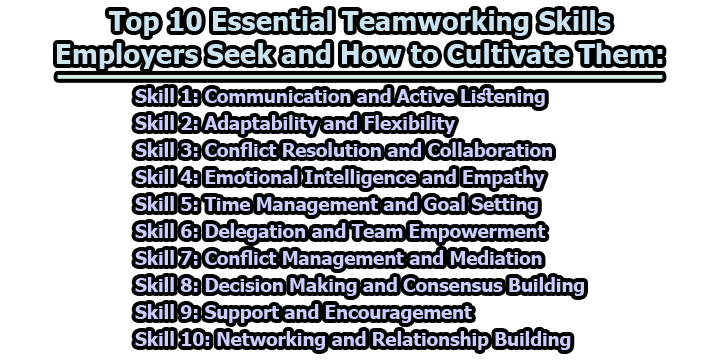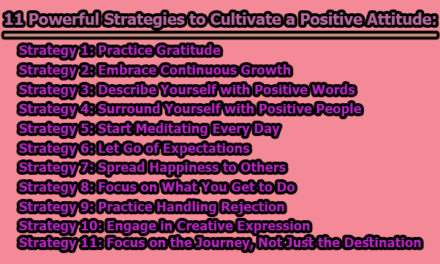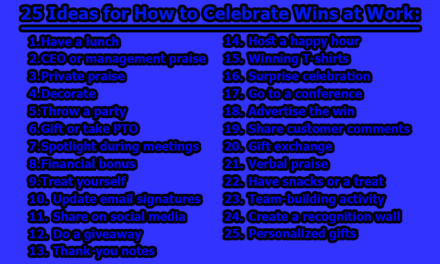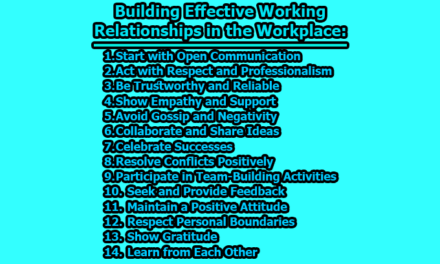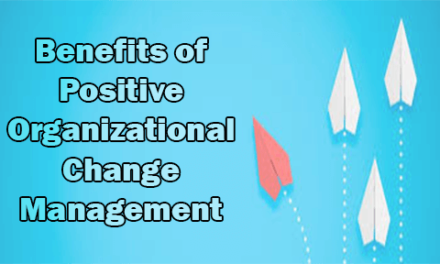Top 10 Essential Teamworking Skills Employers Seek and How to Cultivate Them:
In today’s highly competitive job market, possessing strong teamworking skills is crucial for career success. Employers across industries prioritize candidates who can effectively collaborate, communicate, and cooperate with their colleagues to achieve common goals. Teamwork fosters innovation, enhances productivity, and promotes a positive work environment, making it an indispensable trait in the modern workplace. This article explores the top 10 essential teamworking skills employers seek and how to cultivate them. By understanding the significance of teamwork and investing in personal growth, individuals can position themselves as valuable team members and assets to their organizations.
Skill 1: Communication and Active Listening
Communication is the cornerstone of effective teamwork. Employers value team members who can articulate their ideas clearly and listen actively to others’ perspectives.
Cultivating Communication Skills:
- Engage in public speaking or presentation workshops to enhance clarity and confidence.
- Practice expressing complex ideas in a concise and understandable manner.
- Participate in group discussions and team meetings to practice expressing ideas effectively within a collaborative setting.
- Utilize different communication channels, such as written, verbal, and non-verbal communication, to adapt to various situations.
- Learn from effective communicators, both within and outside your field, to gain insights into different communication styles and techniques.
- Work on improving your body language, tone, and facial expressions to convey confidence and openness.
- Seek constructive feedback from peers and mentors to improve communication.
Developing Active Listening:
- Give full attention to speakers without interrupting or pre-judging.
- Use verbal cues, nodding, and paraphrasing to show engagement and understanding.
- Practice empathy by putting yourself in the speaker’s shoes to better comprehend their viewpoint.
- Avoid interrupting or finishing others’ sentences, allowing them to complete their thoughts before responding.
- Engage in reflective listening, where you summarize and repeat back key points to ensure accurate understanding.
- Be mindful of your own biases and assumptions while actively listening, allowing for an open-minded perspective.
- Practice active listening in both professional and personal settings to enhance your overall communication skills.
Skill 2: Adaptability and Flexibility
In today’s rapidly changing world, adaptability and flexibility are vital teamworking skills. Employers seek individuals who can embrace change and remain composed under challenging circumstances.
Embracing Change:
- Stay updated on industry trends and technological advancements.
- Seek out opportunities to work on diverse projects that require adaptability.
- Emphasize the importance of continuous learning and personal development.
Fostering Flexibility:
- Volunteer for cross-functional teams to gain exposure to different roles and challenges.
- Learn from setbacks and view them as opportunities for growth.
- Maintain a positive attitude and encourage others to see change as a chance for improvement.
- Cultivate a growth mindset that sees challenges as opportunities for learning and improvement.
- Be open to feedback and be willing to adapt your approach based on constructive criticism.
- Embrace a proactive approach to change by anticipating potential shifts and preparing accordingly.
- Encourage a culture of flexibility within the team by recognizing and appreciating adaptive behaviors.
Skill 3: Conflict Resolution and Collaboration
Conflict is inevitable in any team setting, and employers value team members who can navigate conflicts constructively and promote collaboration.
Conflict Resolution:
- Encourage open communication to address issues promptly.
- Be an impartial mediator and focus on finding solutions rather than assigning blame.
- Emphasize the common goals and values that bind the team together.
- Practice active listening during conflict discussions to ensure all perspectives are heard and understood.
- Use “I” statements to express your feelings and concerns without placing blame on others.
- Consider the interests and needs of all parties involved when seeking resolutions.
- Collaborate with team members to identify root causes of conflicts and address them proactively.
Effective Collaboration:
- Foster a culture of trust, respect, and inclusivity within the team.
- Establish clear roles and responsibilities for each team member.
- Promote brainstorming sessions and open idea-sharing to foster collaboration.
- Encourage a supportive atmosphere where team members feel comfortable sharing ideas and opinions.
- Foster a sense of psychological safety, where individuals feel secure taking risks and being vulnerable.
- Celebrate and recognize team successes to reinforce a culture of collaboration and mutual support.
- Establish regular team meetings and check-ins to keep everyone informed and engaged in the collaborative process.
Skill 4: Emotional Intelligence and Empathy
Emotional intelligence is the ability to understand and manage emotions, both in oneself and in others. Employers value team members who can show empathy and build positive relationships.
Developing Emotional Intelligence:
- Practice self-awareness by reflecting on your emotions and their triggers.
- Seek feedback from colleagues and superiors to understand how others perceive you.
- Take courses or workshops on emotional intelligence to enhance your understanding.
Showing Empathy:
- Listen actively and validate others’ feelings and experiences.
- Offer support and assistance to team members facing challenges.
- Show appreciation and recognition for their efforts and contributions.
- Put yourself in others’ shoes to understand their perspectives and feelings better.
- Avoid judgment and be non-judgmental when listening to others’ experiences.
- Express empathy through both verbal and non-verbal cues, such as nodding and maintaining eye contact.
Skill 5: Time Management and Goal Setting
Time management and goal setting are critical for meeting project deadlines and ensuring efficient team performance.
Mastering Time Management:
- Prioritize tasks based on urgency and importance.
- Set realistic timelines for completing assignments and projects.
- Use time management tools, such as to-do lists and productivity apps, to stay organized.
Setting Effective Goals:
- Collaborate with team members to set specific, measurable, achievable, relevant, and time-bound (SMART) goals.
- Break down larger objectives into smaller, manageable tasks.
- Clearly communicate the team’s goals to all members to ensure alignment and understanding.
- Assign responsibilities and deadlines for each team member based on their strengths and expertise.
- Regularly track and measure progress toward goals, celebrating milestones and achievements along the way.
Skill 6: Delegation and Team Empowerment
Delegation is about entrusting tasks to team members based on their strengths, while team empowerment involves fostering a sense of ownership and accountability.
Effective Delegation:
- Understand team members’ skills and capabilities to assign tasks appropriately.
- Provide clear instructions and expectations for delegated tasks.
- Offer support and guidance while allowing autonomy in completing the task.
Empowering the Team:
- Encourage creativity and initiative by valuing diverse perspectives.
- Acknowledge and celebrate individual and team successes.
- Provide opportunities for skill development and growth within the team.
- Foster a culture of continuous learning and professional development, encouraging team members to pursue training and educational opportunities.
- Delegate decision-making authority to team members, empowering them to take ownership of their work and make important choices.
- Create a supportive environment where team members feel comfortable taking risks and learning from failures.
Skill 7: Conflict Management and Mediation
Inevitably, conflicts may arise within a team. Employers value individuals who can manage conflicts effectively and mediate resolutions.
Conflict Management:
- Remain neutral and objective when mediating conflicts.
- Focus on issues rather than personal attacks and grievances.
- Encourage open and honest communication between the parties involved.
Mediation Techniques:
- Identify common ground and shared goals among conflicting parties.
- Facilitate discussions to help team members understand each other’s perspectives.
- Propose solutions that address underlying causes of conflict.
- Create a safe and respectful environment for conflict resolution, ensuring that all team members feel comfortable expressing their viewpoints.
- Use active listening and paraphrasing to demonstrate understanding and validate each party’s feelings and concerns.
- Encourage empathy and perspective-taking, helping team members see situations from each other’s point of view.
Skill 8: Decision-Making and Consensus Building
Employers seek team members who can make informed decisions and build consensus within the group.
Effective Decision Making:
- Gather relevant information and consider various perspectives before making a decision.
- Involve team members in the decision-making process to gain diverse insights.
- Be willing to explain the reasoning behind your decisions.
Building Consensus:
- Encourage open discussions and debate to explore different viewpoints.
- Seek compromises that align with the team’s overall objectives.
- Ensure that everyone has a voice in the decision-making process.
- Use facilitation techniques, such as brainstorming and active listening, to encourage open and inclusive discussions.
- Acknowledge and validate differing opinions, promoting an atmosphere of respect and appreciation for diverse viewpoints.
- Look for areas of common ground and shared values to bridge gaps and find middle-ground solutions.
Skill 9: Support and Encouragement
Supportive and encouraging team members contribute to a positive team culture and foster camaraderie among colleagues.
Being Supportive:
- Offer assistance to colleagues who are facing challenges or feeling overwhelmed.
- Recognize and acknowledge individual and team achievements.
- Promote a culture of continuous learning and development.
Providing Encouragement:
- Use positive language and reinforcement to motivate team members.
- Share constructive feedback in a supportive and encouraging manner.
- Celebrate milestones and progress toward team goals.
- Give specific and genuine compliments to team members to reinforce positive behaviors and contributions.
- Offer words of encouragement and support during challenging times to boost morale and motivation.
- Acknowledge efforts and progress, even if the final goal has not been achieved, to inspire continuous improvement.
Skill 10: Networking and Relationship Building
Strong networking and relationship-building skills help in forming valuable connections within and outside the organization.
Effective Networking:
- Attend industry events, conferences, and seminars to expand your professional network.
- Be proactive in introducing yourself and engaging in meaningful conversations.
- Follow up with new contacts to maintain relationships over time.
Building Meaningful Relationships:
- Show genuine interest in colleagues’ professional growth and well-being.
- Offer help and support to team members in achieving their goals.
- Foster a collaborative atmosphere where everyone feels valued and included.
- Take the initiative to reach out to colleagues and team members to check in on their progress and offer assistance when needed.
- Engage in active listening during conversations, showing genuine interest in what others have to say.
- Offer constructive feedback and encouragement to help colleagues grow and develop professionally.
In conclusion, possessing essential teamworking skills is paramount for professional success and advancement. Employers highly value candidates who can communicate effectively, adapt to changing circumstances, and resolve conflicts constructively. By actively developing these skills through practice, feedback, and a growth mindset, individuals can position themselves as valuable team members in any organization.
Cultivating top-notch teamworking skills not only benefits personal career trajectories but also contributes to the success and cohesion of the entire team and organization. The ability to collaborate, empathize, and lead effectively enables teams to achieve extraordinary results and thrive in today’s dynamic and interconnected work environment. With dedication and continuous improvement, individuals can become invaluable assets, making a significant impact on their teams and propelling their careers to new heights.
Frequently Asked Questions [FAQs]:
Why are teamworking skills important in the workplace?
Teamworking skills are crucial in the workplace because they foster effective collaboration, communication, and problem-solving among team members. When individuals work well together, they can achieve collective goals more efficiently, leading to increased productivity and better outcomes for the organization. Additionally, strong teamworking skills create a positive work environment, promote innovation, and boost employee morale.
How can I improve my communication skills in a team setting?
To enhance communication skills in a team setting, practice active listening, and strive to express ideas clearly and succinctly. Engage in public speaking or presentation workshops to gain confidence and improve articulation. Seek feedback from peers and mentors to identify areas for improvement. Also, be open to diverse communication styles and adapt your approach based on the preferences of your team members.
What are some effective conflict resolution strategies for teams?
When faced with conflicts, encourage open communication to address issues promptly. Stay neutral and focus on finding solutions rather than assigning blame. Emphasize common goals and values that bind the team together. Consider involving a neutral third party as a mediator if necessary. Employ active listening and empathy to understand the perspectives of all parties involved, facilitating a constructive resolution.
How can I develop adaptability and flexibility in the workplace?
Develop adaptability and flexibility by staying updated on industry trends and technological advancements. Seek out opportunities to work on diverse projects that challenge your abilities. Emphasize the importance of continuous learning and personal development. Embrace change with a positive attitude, viewing challenges as opportunities for growth. Learn from setbacks and view them as stepping stones to improvement.
What role does emotional intelligence play in team dynamics?
Emotional intelligence plays a vital role in team dynamics as it involves understanding and managing emotions in oneself and others. Team members with high emotional intelligence can navigate interpersonal relationships effectively, exhibit empathy and sensitivity to others’ feelings, and maintain composure during challenging situations. This fosters trust, respect, and positive communication among team members, leading to improved collaboration and overall team performance.
How can I effectively delegate tasks and empower my team?
To delegate tasks effectively, understand your team members’ skills and capabilities, and assign tasks accordingly. Provide clear instructions and expectations, offer support and guidance, but also allow autonomy in completing the task. Empower your team by encouraging creativity and initiative, acknowledging and celebrating their achievements, and providing opportunities for skill development and growth within the team. Create a supportive environment where team members feel confident in taking ownership of their responsibilities.
What are some strategies for building meaningful relationships within a team?
Show genuine interest in your colleagues’ professional growth and well-being. Offer help and support to team members in achieving their goals. Foster a collaborative atmosphere where everyone’s contributions are valued and included. Engage in active listening during conversations, be willing to share credit, and celebrate team successes. Participate in team-building activities to strengthen bonds and promote team cohesion.
How can networking benefit my career?
Networking can benefit your career by expanding your professional contacts and opening doors to new opportunities. It allows you to learn from industry experts, gain insights into different industries, and stay updated on the latest trends and developments. Building a strong network can lead to potential collaborations, job referrals, and business partnerships. Additionally, networking helps improve communication and interpersonal skills, which are valuable assets in any career path.
How do teamworking skills contribute to overall organizational success?
Teamworking skills contribute to overall organizational success by enhancing team collaboration, communication, and problem-solving capabilities. Effective teams are more productive, innovative, and resilient in the face of challenges. They can achieve goals more efficiently and deliver high-quality results. A positive team culture fosters employee satisfaction, leading to reduced turnover and higher employee retention rates. Ultimately, organizations that prioritize and cultivate teamworking skills can achieve greater success and competitiveness in their respective industries.

Library Lecturer at Nurul Amin Degree College

